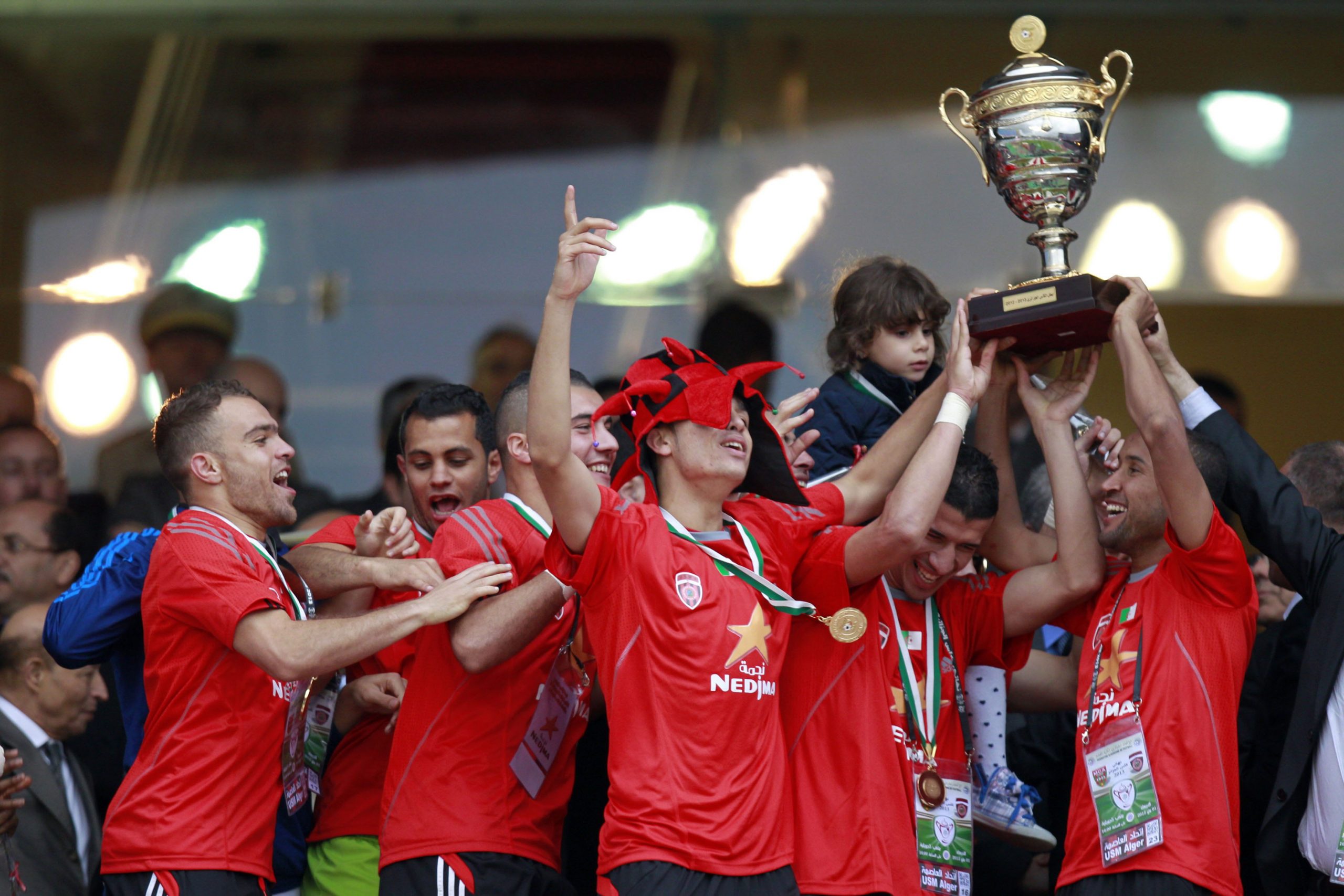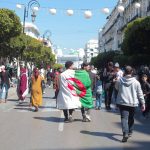The battle for USM Alger’s soul
The Algerian football club is caught in a quagmire with its president and majority shareholder, Ali Haddad, feeling the brunt of the protests that removed former president Abdelaziz Bouteflika from…
Author:
9 November 2019

With eight league titles and eight Algerian Cups, USM Alger (USMA) is one of the most successful football clubs in Algeria. Yet, what defines the club is its revolutionary history and the authenticity of its supporters.
Those supporters are now locked in a paralysing stalemate as they attempt to wrest ownership of the club from Ali Haddad, a public works tycoon and one of Algeria’s richest men. He is the majority shareholder and president of the club.
Haddad holds 92% of USMA through his company, ETRHB (Entreprise des Travaux Routiers Hydrauliques et Bâtiments). The Algerian Football Federation encouraged the transaction through a “professionalisation” process, the goal of which was to privatise clubs and wean them off the government’s payroll.
In the oligarchy perpetuated by former president Abdelaziz Bouteflika, Haddad was the worst example of the rotting business class. His connections were used to obtain authorisation to open television channels, which started their news bulletins by describing where Haddad had travelled on that particular day and how the business forum he chaired was flourishing.
As his media outlets were used for public relations, USM Alger became an entity through which Haddad could “sports wash” his money and image. He renovated USMA’s antiquated home, Omar Hamadi Stadium. The club hired brand-name coaches like Rolland Courbis and Hervé Renard, along with competent support staff, and recruited the league’s best players on exorbitant salaries. To this day, Youcef Belaili remains the highest paid footballer in Algerian league history. He made about $30 000 (around R415 000 at the time) a month in Algiers.
Despite the success, Haddad never managed to curry favour with the USMA faithful. If he wanted to buy popularity, he was doing it at the wrong club. Haddad was new money; USMA was tradition, class and old Algiers. Divorce was inevitable and, after nine months of political protest, it is now imminent.
Fans vs Haddad
As Haddad’s money flooded the front office, USM Alger supporters grew closer to their roots. They became more politicised. A main fan group emerged as the voice of the club, named Ouled El Bahdja (Sons of Algiers). In 2017, Ouled El Bahdja started recording and publishing songs on their YouTube channel and quickly built a reputation as the most politically conscious supporter group in the country.
Their renditions were immediately memorised by the masses and recited on the terraces. In a song titled Qilouna (Leave Us Alone), lyrics rail against the government’s attempt to exploit shale gas despite widespread protests in the country.
Related article:
This year, their song La Casa Del Mouradia, which criticises Bouteflika’s reign on a term-by-term basis, became an anthem for the Hirak. Though the Algerian stadium is an exclusive, male-dominated arena, La Casa Del Mouradia helped stadium culture permeate the democratic protests.
The nail in the coffin came on 17 February, when Ouled El Bahdja released a song called Ultima Verba, based on a poem by French playwright Victor Hugo. For the first time, the lyrics took a direct shot at Haddad and his public works company, ETRHB.
“The state will fall, and so will he [Haddad] who built the [East-West] highway,” they declare.
As the protest movement grew in Algeria and it became evident that the military was abandoning the Bouteflika regime and its oligarchs, Haddad attempted to flee the country. He was intercepted at the Tunisian border and slapped with a trivial charge of possessing two valid passports.
His arrest was followed by those of more than a dozen other business officials and former government strongmen, including two former prime ministers and a slew of ministers who are all behind bars for alleged corruption.
Hot potato
Notwithstanding Haddad’s frozen assets, USM Alger sputtered to an eighth league title in May last year. In August, rumours of a takeover percolated but never materialised. The club management hastily formed an emergency committee and named Billel Dziri, a USM Alger legend, as head coach during an extraordinary general assembly.
USMA’s financial wellbeing continued to deteriorate and as the months passed, players understandably began to grumble about their unpaid salaries. Big earners such as Abderrahmane Meziane, Mohamed Benkhemassa and Prince Ibara left to play overseas, reducing the wage bill.
Club spokesperson Amine Tirmane elaborated on USM Alger’s desperation in French newspaper Le Monde in August. “There is no more money available. The accounts are blocked … ETRHB still holds 92% of the club’s shares. The Algerian group Al Hayat Petroleum made an offer to ETRHB, which accepted it. But the legal authorities of the country have not yet unlocked the situation. USMA is sort of being taken hostage.”
The Ministry of Youth and Sport made an empty promise to help cover the travelling costs for Confederation of African Football (CAF) competitions, but there was no legal progress to force Haddad to sell USMA.
The president of the interim administrative council, Boualem Chendri, did not mince his words concerning the political and economic obstacles USMA have faced after a league match against CA Bordj Bou Arréridj.
“Sports officials are making fun of us. Shame on them,” Chendri said. “The key to the problem is not in our hands. The first time we met with the minister, we gave him a complete file on the situation of the club. Afterwards, he tells us that he has not received anything. It was explained to him at the time that we were in crisis. We subsequently sent him four letters, which he did not respond to.”
Related article:
For cynical supporters, the game of hot potato that administrators are playing with the club is a response to the politicised expression of Ouled El Bahdja and USMA supporters. As a result, tens of thousands of supporters met at the club cafe on 19 October to hold a public demonstration, marching from Bab El Oued, a working-class neighbourhood in West Algiers, to the Ministry of Youth and Sport downtown.
A middle-aged supporter named Mohamed was holding up a banner that read, ironically, “Free USMA from Political Issues”.
“USMA is targeted,” he said. “They want to break our club. It is not normal that our accounts are blocked for eight months.”
Public enterprise?
In Algeria, when clubs are in financial trouble, if enough pressure is applied in the right places, politicians may convince national enterprises to take over clubs.
CR Belouizdad (CRB), another mythical club in Algiers, nearly went into administration last season. With the right pressure applied through the media, demonstrations in the city centre and #SaveCRB hashtags all over city walls, former national tobacco company Madar Holdings took over the club.
In less than six months, Madar completely revamped the squad, constructed new offices, won an Algerian Cup and had CRB sitting at the top of the Algerian Ligue 1 table.
Utility Sonelgaz and public works firm Cosider, two state-owned companies, have been touted in the press as interested in taking over USMA. But a takeover would need to be rubber-stamped by various sectors of government and may take a long time to be approved.
Only one private company seems interested in purchasing USMA, Al Hayat Petroleum. Very little is known about Al Hayat, though that did not stop USM Alger from accepting its gestures of goodwill, when the conglomerate covered the club’s expenses for games against Gor Mahia in Kenya and Sonidep in Niger in the CAF Champions League.
Related article:
“The board of USM Algers is very honoured to announce that the Al Hayat Petroleum Group has committed to provide travel expenses of the club in Niamey for the preliminary round of the Champions League,” the club announced on its official Facebook page.
“Al Hayat Petroleum is the group that intends to invest and buy the shares of the ETRHB and become the majority shareholder of the club. USMA management would like to thank the Al Hayat Petroleum Group for this initiative, which allows USMA to avoid forfeiting.”
Supporters at the 19 October march were open to the prospect of a takeover by a public enterprise.
“Sonelgaz, Hayat Petroleum, Cosider … It does not matter to me,” says Mahfoud, who has followed the club for decades.
A younger supporter in a counterfeit Lacoste tracksuit was less welcoming. “We do not want a saviour company, we do not want money, we do not want anything. We just want them to free our club and leave us alone.”



